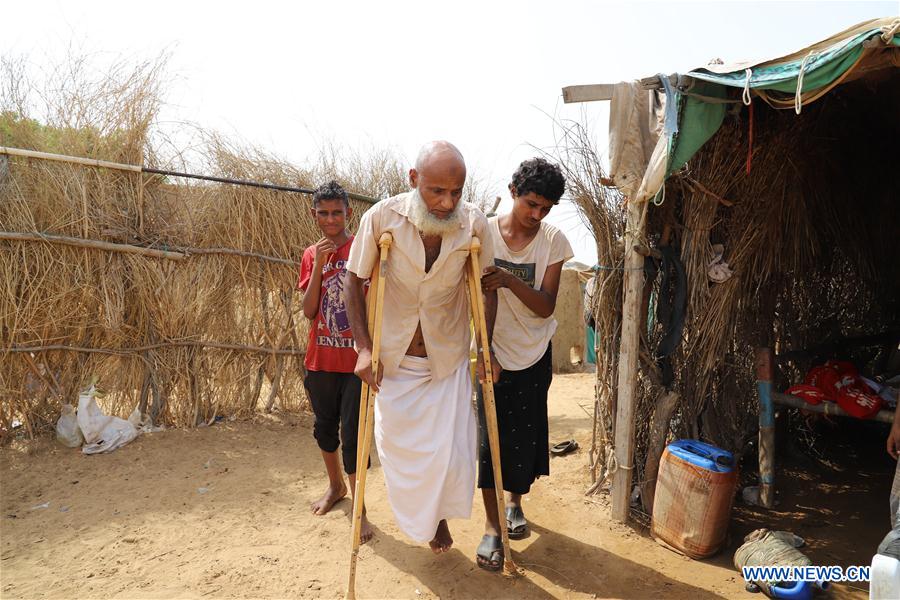
Fatima's husband Ali Mohammed Tahir (C) walks outside a tent in Midi District of Hajjah province, Yemen, June 14, 2020. In a camp for people displaced by war, in Yemen's northwestern province of Hajjah, a mother with cancer lies in bed in her tent, without treatment. The mother, Fatima, has fled airstrikes and shelling on her Red Sea coastal village to seek a safe life for herself and her 12-member family in the displaced camp in the southern edge of Midi district, but unexpected cancer shattered her hopes. (Photo by Mohammed Alwafi/Xinhua)
HAJJAH, Yemen, June 22 (Xinhua) -- In a camp for people displaced by war, in Yemen's northwestern province of Hajjah, a mother with cancer lies in bed in her tent, without treatment.
The mother, Fatima, has fled airstrikes and shelling on her Red Sea coastal village to seek a safe life for herself and her 12-member family in the displaced camp in the southern edge of Midi district, but unexpected cancer shattered her hopes.
The cancer has spread in the left side of her neck and she becomes unable to speak or move, her doctors in the Al-Jada Health Center in Al-Jada area in Midi district told Xinhua.
They said that there were 12 other cancer patients in the district of Midi and the nearby district of Hiran.
"We cannot provide treatment for them because there is no medicine, no medical equipment and no medical staff specializing in treating cancer diseases in the center," one of the doctors in Al-Jada Health Center told Xinhua.
Fatima's husband, Ali Mohammed Tahir, who suffers from diabetes and has his right leg amputated due to the disease, cannot afford to take her to the cancer hospital in the Houthi-held capital Sanaa, about 123 km south of Hajjah.
"My wife has cancer in her neck since a year ago. Her suffering has increased and here we have no medicine for cancer," he told Xinhua in his tent.
"I have diabetes and my right leg was amputated. We do not find health care here and we do not find anything in this area," Tahir added.
In this barren area, hundreds of displaced families are suffering from hunger, a lack of access to health care and clean water supplies.
Many other displaced camps in Hajjah and other provinces also suffer from the same health crisis.
The fighting has been raging on in several active front lines in northern Hajjah since the country slid into civil war in late 2014, when the Iran-backed Houthi group seized much of the country's north and forced the Saudi-backed government of President Abd-Rabbu Mansour Hadi out of the capital Sanaa.
The five-year-long war has killed tens of thousands of people, displaced more than 3 million and pushed the country to the brink of famine.
The war also led to the collapse of more than half of the country's health system, and caused what the United Nations calls the world's largest humanitarian crisis.
Millions of Yemenis have become vulnerable to deadly epidemics, which are rife across the country, including cholera, malaria, diphtheria and now the novel coronavirus.
The cancer patients have become the most affected by the war and health crisis.
The World Health Organization in February 2019 estimated that the number of cancer patients in Yemen reached approximately 35,000.
Most cancer patients in Yemen seek treatment at the National Oncology Centre in Sanaa, which is the country's main public hospital for cancer treatment.
The center in Sanaa admits around 600 new cancer patients each month, according to its recent reports.
The center said it completely dependent on international humanitarian aid after the country's economy and health sectors have collapsed due to the war.
The mother, Fatima, is still able to wave her hand in front of her children. She hopes that her children can one day enjoy a new life, away from war and cancer.



